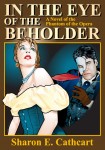
I’m sitting here in my virtual living room with author Sharon Cathcart, to talk about psychological depression—which I’ve had my own experiences with, as you may know if you’ve been following this blog for any length of time.
Sharon has been a journalist, a newspaper editor, and an award-winning poet. Now, she’s authored a novel, In the Eye of the Beholder, as well as a memoir—more a collection of thoughts on various subjects—called Les Pensées Dangereuses, “Dangerous Thoughts.”
Hi, Sharon.
Hi, Tim.
In Les Pensées Dangereuses, you talk about your experiences with depression. Some people think depression means that your brain has basically shut down, that you’re not even thinking anymore.
Not at all. Everyone’s experience is different, but in my case—and in the case of many people whose work I have read or with whom I have spoken—the opposite was true. I couldn’t stop thinking. There were so many ideas whirling around in my head, like a carousel that was out of control. None of the ideas had a chance to get off and stand on their own. It is easy under those circumstances to feel overwhelmed and helpless—as though starting any task, even a tiny bit of it, is monumental and impossible because of the relentless thinking. Much of the thinking in depression is distorted to boot—it doesn’t bear up with the reality of situations in many cases.
Right. That’s very similar to what I’ve experienced. In particular, my mind fills with worry, usually about things I feel powerless to fix, and it not only overwhelms me, but it also makes me feel sad.
I fought against it for a long time. I thought I had to fix it. What it is now is something that I accept. Some days are going to totally suck. Some days, getting out of bed is a victory. Accepting that, at some level, I will struggle more than someone else to do certain things—no matter how much I want to—has been unbelievably helpful. The self-loathing that went along the lines of “Dammit, you could do this before. What the hell is your problem? It’s just getting these stupid groceries to the checkout stand, after all!”— That’s gone.
I guess I say all of that to say that sometimes the world feels overstimulating. Easy tasks are sometimes harder to accomplish.
I feel like it’s akin to any other chronic illness that makes it harder to do the things you want to do. There’s a great website called butyoudontlooksick.org, which has something they call the “spoon theory.” It’s the idea that you have an allotted amount of energy for a day, represented by a finite number of spoons. Some days you need more spoons than others, but when they’re gone, they’re gone. Believe me, there have been days when the only thing left in my silverware tray is a broken spork.
Do you think your experiences are typical?
I have talked with a number of people with depression, and I read a lot about the disease. Every one of us is different in our illness, just as each person is different in his or her life experiences. Some people are helped by medications, but only a small percentage. A recent article in Newsweek indicated that about 87 percent of people on anti-depressants see no effects. I am one of those people. The people for whom those medications help are blessed in many ways, because modern medicine would prefer to throw a pill at an ailment than do something different.
Yes. Not even my readers may know this, but I too had a short bout with antidepressants, and I can’t say that they helped me at all, although I did experience some pretty embarrassing side-effects.
Hippocrates was the first person to document depression, which he called “melancholia.” That means “black bile,” by the way, which is what he thought caused it. This ailment is as old as mankind, and we don’t really know what causes it.
What’s the one biggest tip you can give depressed people to make them feel better?
The thing that helped me the most was something I learned in a therapy group that I had been reluctant to attend. By the way, talk therapy is effective for many people, and I highly recommend it. Anyway, the leader of the group handed out a list of 200 free or inexpensive pleasant activities and said that we had homework each week. We were to do a pleasant activity every single day and come back and talk about it. His favorite one on the list was to go to an expensive hotel and sit in the lobby bar. He would order a soda and watch the people go by, making up stories in his head about what he thought they were doing in town, where they were going, etc. The pleasant activities were a big help to me. Still are, in fact.
I also think it’s important to be gentle with yourself. Beating yourself up for being unwell is not helpful and is, in fact, counterproductive. Offer yourself the same gentle support you would offer to your best friend in the same situation.
Let’s talk about In the Eye of the Beholder. What does the title refer to?
It’s the old proverb or saying, “Beauty is in the eye of the beholder.” What inspired the title, though, was the Confucian saying, “All things have beauty for those with eyes to see.”
I didn’t have a title for the book for a long time; it was “the Erik/Claire novel.” Then, I saw that saying by Confucious and I realized what I should call the book. It refers to the compassion that both Erik and Claire show to each other through a relationship that is most kindly described as turbulent.
Why a Phantom of the Opera story? What about Phantom inspired you to write In the Eye of the Beholder?
I’ve loved the story since the first time I read Gaston Leroux’s novel more than 20 years ago. It is a story of the importance of compassion, and what the lack of it can do to others. Leroux’s work was a thinly veiled commentary on the shallowness of Parisian society; he showed how a lifetime of abuse and “othering” could warp the mind of even the most talented and brilliant person.
I saw the 2004 Phantom of the Opera film in the theatres twice. I’ve always loved the music, and this film was no exception. The first time I thought it was a magnificent spectacle. The second, something happened inside me that I still cannot explain. I didn’t speak to anyone for three days after that while I tried to process what I was feeling.
Then, for the first time in years, I decided to write a short story. What would happen, I wondered, if an older woman who was not a simpering virgin were to meet and deal with Erik? The short story grew and grew until it became a novel. I was honored and delighted to have Turner Maxwell Books in the UK offer to publish the paperback; they are a small cooperative press and I’ve been very pleased with them. Their contract also allowed me to publish the eBook version in the US.
Where can people find out more about your work?
I have a fan page on Facebook, as well as my author website. The site has purchase information for both In The Eye of The Beholder and Les Pensées Dangereuses, a link to my blog and more.
Thanks so much for joining us.
Thank you for this great opportunity. I am delighted to share with your readers.
Be sure to check out Sharon’s web page, and especially her Goodreads Author Blog on her site.
Till next time…
-TimK

Wow, Sharon! I enjoyed the interview, appreciated your openness concerning the depression and laughed heartily (even though that may not be the correct response) to the spork comment because I have felt that way myself! I know many, many creative people who battle exactly what you have described, many who are not willing to let others know. My hat is off to you.
I did not mention to Tim in my interview but I credit The Phantom with my “return” to writing as my first undoubtedly never to be published novel is also a Phantom novel. I look forward to reading yours in the near future. Thank you again for sharing.
I’m so glad you laughed, Linda. 🙂 I think that’s wonderful.
I find that, in so many cases, when we “out” ourselves and refuse to be ashamed of our reality, a burden lifts. My decision to let people see what went on inside me did exactly that.
I’m grateful for your comments. 🙂